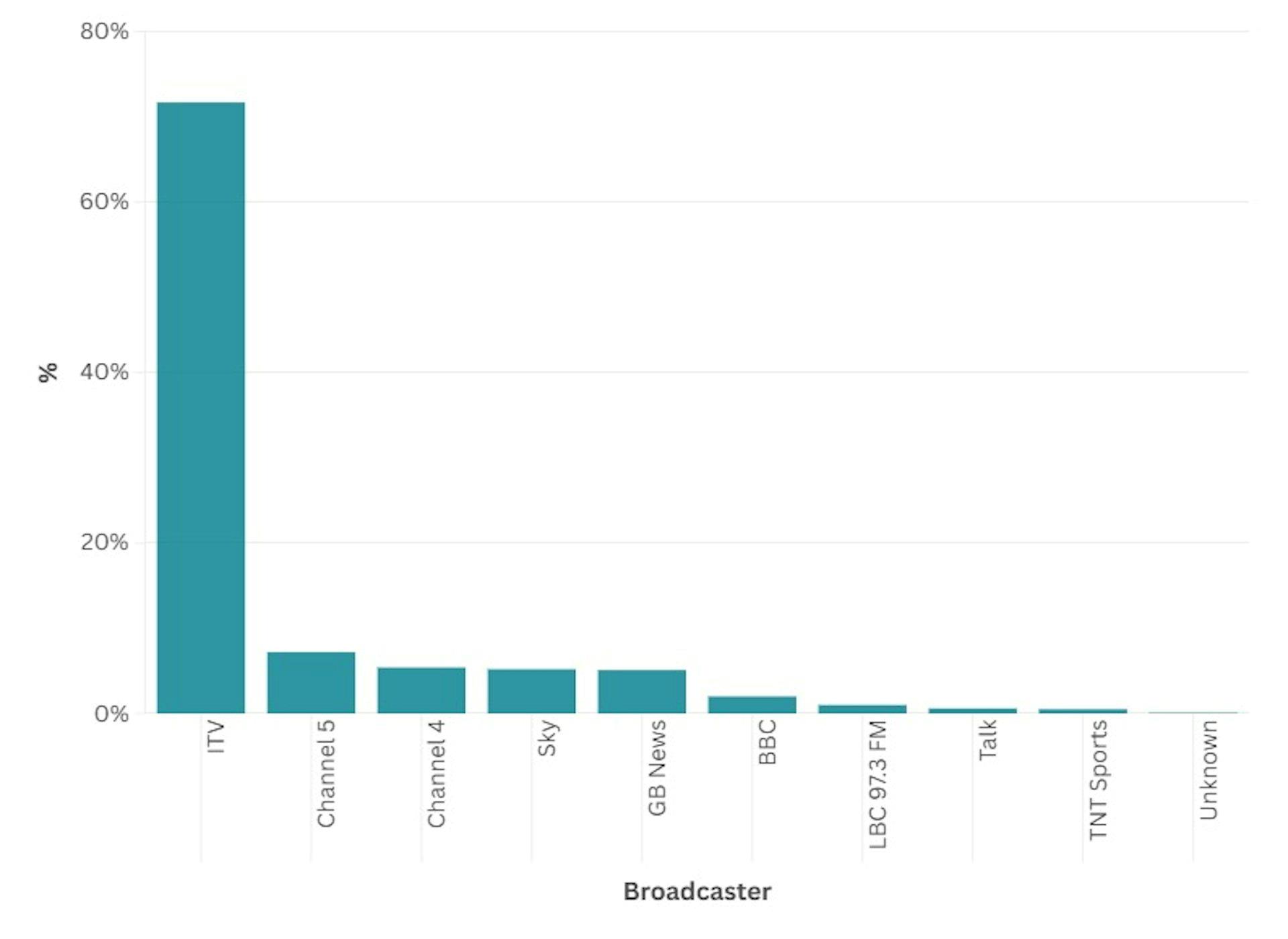
Bob Vylan Glastonbury Complaints Upheld: Here's What Viewers Complain To Ofcom And The BBC About Most
However, the BBC's Executive Complaints Unit cleared the BBC of breaching rules on impartiality, saying:“Coverage of a music festival is clearly not on the same footing as coverage of news and current affairs; [...] a wide tolerance for expressions of opinion by performers or audiences would be in keeping with audience expectations for events it does cover.”
This aligns with a pattern revealed by our ongoing research into impartiality at Cardiff University – viewers have significant concerns about BBC impartiality and frequently lodge complaints about it. But those complaints are rarely upheld.
We tracked all the complaints to Ofcom and the BBC between January and August 2025.
Ofcom received 33,108 complaints about all UK broadcasters. Of those, 71.7% were about ITV programming, with over 50% related to Love Island. In the latest series, audiences made thousands of complaints alleging gaslighting and bullying on screen. The regulator rejected all of the complaints.
By comparison, news programming such as GB News – which often attracts headlines for allegedly breaching rules on impartiality – and Sky News received far fewer complaints (making up 5.1% and 4.7%, respectively).
Ten most complained about broadcasters (Ofcom)

The most common complaint category was“generally accepted standards”. This is an Ofcom complaint category designed to protect the public from harmful or offensive material, including offensive language, discrimination, and sexual or violent content. More than half of all complaints fell into this category.
By contrast, there were far fewer complaints related to the impartiality of broadcasters: due accuracy (4.5%), due impartiality/bias (3.3%), and due impartiality (just four cases).
BBC complaintsUnlike other UK broadcasters, the BBC operates its own complaints process, BBC First. Under this system, concerns must be raised with the BBC directly before they can be escalated to Ofcom.
If broadcasters are found in breach of the rules, Ofcom can impose a range of penalties including fines and even revoking a broadcaster's licence.
Between January and August 2025, the BBC received 9,602 complaints. More than half (52.5%) concerned BBC iPlayer, followed by BBC One (19.6%), BBC Radio 4 (12.6%) and BBC News (8.7%).
Ten most complained about services (BBC)
As with Ofcom, entertainment and music were the biggest drivers of complaints for the BBC. These were dominated by Glastonbury and Bob Vylan's performance, which made up 52% of complaints. News and current affairs followed (32.5%), with BBC News and Today among the frequently complained about.
Ten most complained about series (BBC)
Our analysis reveals a major difference in the types of complaints the BBC receives about its output compared to those made to Ofcom about other broadcasters.
For the BBC, impartiality overwhelmingly dominated, accounting for 72.9% of all complaints. By comparison, fairness (4.6%), gender discrimination/offence (4.4%) and accuracy (4.4%) were far less prominent.
This suggests audiences strongly associate the BBC with impartiality, and complaints are more likely where it is believed one party or political issue was favoured over another.
Complaints rarely upheldDespite differences in what audiences complain about to the BBC and Ofcom, the outcome of complaints was broadly similar across both organisations. In both cases, it was extremely rare for the regulator or broadcaster to uphold the complaints (find the content to have breached standards).
At Ofcom, only eleven complaints were upheld (0.03%). At the BBC, 4.6% were upheld and 0.2% upheld in part. However, outcomes for 21.9% of BBC complaints remain unknown, as the organisation does not always publish full details online.
Our review of the specifics finds that complaints which are upheld are often concerning concrete, provable breaches. For Ofcom, this included offensive language likely to be heard by children, and programming giving undue prominence to a product. At the BBC, upheld complaints were most often about accuracy, such as the misrepresentation of political figures .
When it comes to impartiality specifically, the majority of complaints were halted early.
Complaints dealt with by Ofcom, show 97.9% related to due accuracy, 100% related to due impartiality, and 77.4% related to due impartiality/bias were not pursued. At the BBC, 98.8% of impartiality complaints, 99.5% of bias complaints, and 83.4% of accuracy complaints were resolved at the initial stage.
A small number of cases did progress. Between 2021 and 2025, Ofcom recorded just ten confirmed breaches of impartiality. GB News accounted for five of these cases, followed by the BBC with three, and then isolated incidents involving other broadcasters such as Times Radio and ITV.
Our systematic examination of complaints and whether they were upheld reveals a clear distinction between the importance of impartiality in the public's perception of broadcasters and actual regulatory outcomes. Despite thousands of complaints, audience concerns are rarely deemed to officially be breaches of broadcasting standards.

Legal Disclaimer:
MENAFN provides the
information “as is” without warranty of any kind. We do not accept
any responsibility or liability for the accuracy, content, images,
videos, licenses, completeness, legality, or reliability of the information
contained in this article. If you have any complaints or copyright
issues related to this article, kindly contact the provider above.
Most popular stories
Market Research

- R0AR Chain Announces $100,000 Community Rewards For Creators, Yappers, And Brand Evangelists
- Cryptolists Recognised As“Crypto Affiliate Of The Year” At SBC's Affiliate Leaders Awards 2025
- Tradesta Becomes The First Perpetuals Exchange To Launch Equities On Avalanche
- 0G Labs Launches Aristotle Mainnet With Largest Day-One Ecosystem For Decentralized AI
- Nebeus Overfunds Equity Crowdfunding Campaign With €3.6M Raised, Reflecting Growing Demand For Regulated Cryptofinance Solutions
- Daytrading Publishes New Study Showing 70% Of Viral Finance Tiktoks Are Misleading



















Comments
No comment